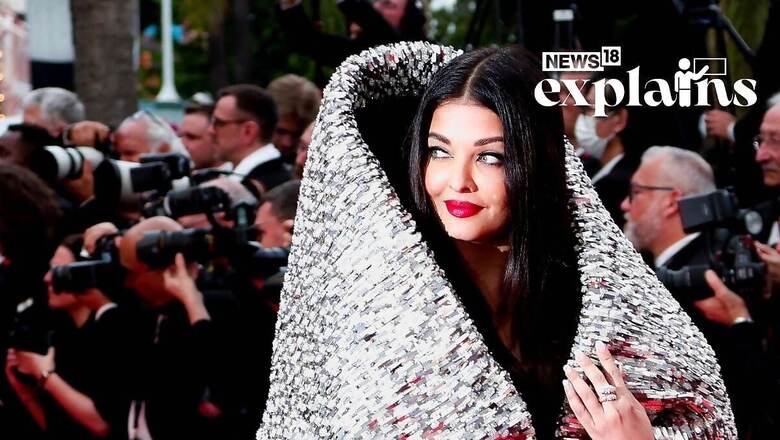
views
Aishwarya Rai Bachchan kept her date with the Cannes Film Festival as she turned heads at the movie gala in a shimmery outfit. A regular at the iconic festival, Aishwarya attended the premiere of Hollywood veteran Harrison Ford’s fifth “Indiana Jones” movie “The Dial of Destiny” on Thursday.
The 49-year-old actor wore a lightweight aluminium detailed gown with a signature cinched corset and an embellished hood. She later posed for the shutterbugs.
According to the label’s official Instagram page, the outfit is a part of the Cannes Capsule Collection. Aishwarya, who has been attending the Cannes Film Festival for the past many years, arrived at the French Riviera with daughter Aradhaya Bachchan earlier this week.
Amid the hullabaloo over the Cannes festival, let’s take a look at the film festival’s history:
Its History
Its history dates back to 1936, when tensions were rising in the run-up to World War II.
In 1938, a few months before the European War began, some countries gathered in Italy to attend the Venice Film Festival, which at the time was one of the world’s few competitive film festivals, featuring the United States and a few European countries. Fascist parties dominated Italy and Germany, respectively, under Benito Mussolini and Adolf Hitler, as per a report by the Indian Express.
When it came time to select the best film, the jury unanimously chose an American film. “But under pressure from Hitler the Nazi propaganda film Olympia by director Leni Riefenstahl and the Italian film Luciano Serra, Pilot by director Goffredo Alessandrini reaped the ultimate accolade, named the Mussolini Cup,” says its website. Riefenstahl made propaganda films for Hitler’s Nazi regime.
In reaction, the United Kingdom, the United States, and France withdrew from the event. Phillipe Erlanger, a French representative, would then consider organising a French event as an alternative. The French Foreign Minister, Georges Bonnet, was concerned about the impact on Franco-Italian relations, but Education Minister Jean Zay and Interior Minister Albert Sarraut supported the idea of a film festival for Europe in which art would no longer be influenced by “political manoeuvring.”
Thus, a festival was ready to be proclaimed in 1939, with backing from countries such as the United States, as per the report. Cannes, a coastal city on the southern tip of France, was chosen for its location as a resort town and after lobbying by local hoteliers and business owners.
However, tensions in Europe caused the inaugural edition to open in 1946, with stars such as Kirk Douglas, Sophia Loren, Grace Kelly, Brigitte Bardot, Cary Grant, Gina Lollobrigida, and the painter Pablo Picasso in attendance. It included 19 countries as well as an international jury.
How did Cannes Film Festival Become Popular?
While the first few Festivals were primarily social events, with almost every film that was screened receiving a prize, the sight of stars from all over the world processing up the famous red steps and the constant swarm of media attention quickly transformed it into a world-famous, legendary event, according to the Cannes website.
The presence of celebrities such as Kirk Douglas, Sophia Loren, Grace Kelly, Brigitte Bardot, Cary Grant, Romy Schneider, Alain Delon, Simone Signoret, Gina Lollobrigida, and Pablo Picasso flocked to the new ‘Palais Croisette’*, which had been inaugurated for the 1949 season, boosted the Festival’s popularity even further in the 1950s.
However, it was during this decade that the Festival was most vulnerable to the vicissitudes of the Cold War. Aside from the sequins and the early controversies, the films served as a large screen onto which the Eastern Bloc and the West projected their conflict. To avoid diplomatic squabbles over film selection, the organisers added an article to the Festival rules authorising the withdrawal of a film under specific situations.
The committee used this option eleven times during the 1950s, setting a record in 1956 with six films prohibited. The next year, the organisers opted to remove the clause entirely from the regulations, ushering in a new era in the Festival in which the cinematographic quality of the films took precedence over any diplomatic considerations.



















Comments
0 comment